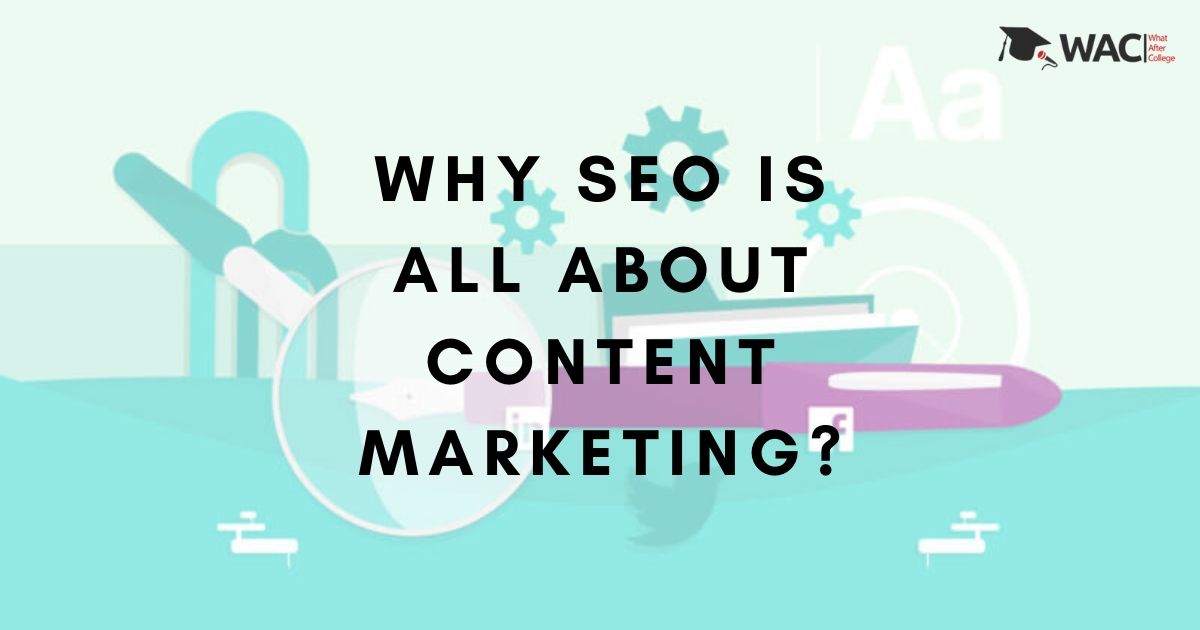Many people are confused about the meaning of the terms, SEO, and Content Marketing. This often results in confusion. Before we get into the reasons why SEO is mainly about Content Marketing, we’ll define these two terms.
Search Engine Optimization (SEO) is a technique that helps search engines find and rank the websites in their search results. If you optimize your site accordingly, you get can get the top positions on the Search Engine Results Page (SERP). There are various methods in SEO, but the main objective is to improve the visibility of the page. Content marketing is a part of SEO, and SEO cannot be successful without content marketing.
On the other hand, Content Marketing is the practice of marketing your products, services by creating articles, blogs, or any type of meaningful content. This helps in engaging the public with your website, which ultimately results in more visibility.
They are both distinguished from each other but we cannot completely separate them from each other. The main point of difference between these two are:
- The SEO is more technical than Content Marketing, and
- Content Marketing is a broader and more holistic term.
Now, we’ll talk about how SEO and Content Marketing are related; and the reason why SEO is all about Content Marketing.
1. Content Marketing Provides The Content
SEO simply cannot be done without content. Websites need articles, words, photos, that must include the keywords. It has been said many a time because of the truth it portrays, Content is King.
Since content marketing is all about the actual content it provides, the practical application of SEO cannot be done without it.
2. Content Marketing Means Using Keywords
Another feature of SEO is Keywords. It is one of the fundamental elements of SEO. You must research the relevant keywords, and use them on your website. However, you cannot just use them without content. It’s not possible. Content marketing by the means of actual content gives you a way to use the keywords appropriately and strategically on your website for the SEO. It helps you target the humans you write the content for.
3. Content Marketing Involves Linking
One of the highest-ranking factor on the Google Algorithm for search results is the number of appropriate links you have that connect directly to your website. This can only be possible if you have enough content on your site.
The best way to build links is by publishing amazing, shareable, and engaging content on your website. This is where content marketing steals the position of being the most important feature of SEO.
4. Content Marketing Involves User Experience
SEO as a whole is mostly the technical part of optimizing your site. It involves the metadata, constructing sitemaps, indexing, using proper tags, etc. However, a user on your website does not care about all that stuff. It mostly just makes your content visible and reachable to the user, so they can engage with your content. Content plays the most important role. If your content isn’t interesting enough, a user may exit your website whole together. So, essentially content marketing is the link between your website and the end-user of your products or services.
5. Content Marketing Involves Consistency
Search engines like fresh content. They put those websites on top of the SERPs, whose content is updated regularly. New content ranks higher than the old content.
Therefore, good SEO includes consistency in your content. Content Marketing has to be actively done to get a boost on SEO.

All you need to know about Digital Marketing
Learn Digital Marketing
| Top 7 Digital Marketing University/ Colleges in India | Top 7 Training Institutes of Digital Marketing |
| Top 7 Online Digital Marketing Training Programs | Top 7 Certifications of Digital Marketing |
Learn Digital Marketing with WAC
| Digital Marketing Webinars | Digital Marketing Workshops |
| Digital Marketing Summer Training | Digital Marketing One-on-One Training |
| Digital Marketing Online Summer Training | Digital Marketing Recorded Training |
Other Skills in Demand
| Artificial Intelligence | Data Science |
| Digital Marketing | Business Analytics |
| Big Data | Internet of Things |
| Python Programming | Robotics & Embedded System |
| Android App Development | Machine Learning |

